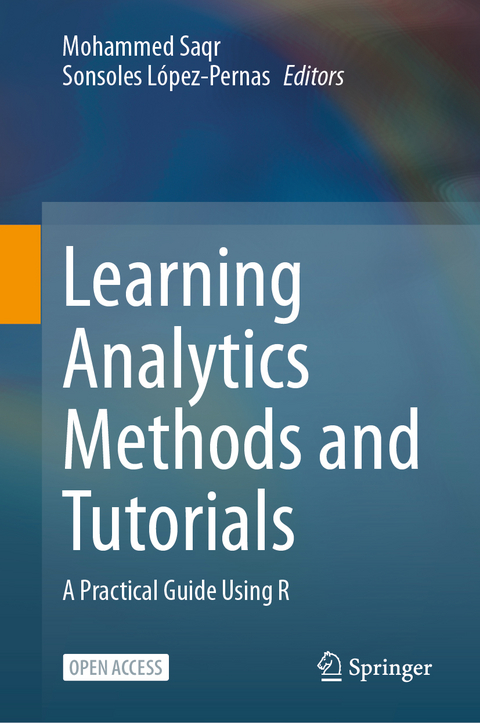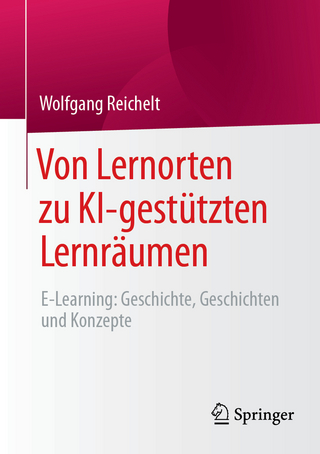
Learning Analytics Methods and Tutorials
Springer International Publishing (Verlag)
978-3-031-54463-7 (ISBN)
This open access comprehensive methodological book offers a much-needed answer to the lack of resources and methodological guidance in learning analytics, which has been a problem ever since the field started. The book covers all important quantitative topics in education at large as well as the latest in learning analytics and education data mining. The book also goes deeper into advanced methods that are at the forefront of novel methodological innovations. Authors of the book include world-renowned learning analytics researchers, R package developers, and methodological experts from diverse fields offering an unprecedented interdisciplinary reference on novel topics that is hard to find elsewhere.
The book starts with the basics of R as a programming language, the basics of data cleaning, data manipulation, statistics, and analytics. In doing so, the book is suitable for newcomers as they can find an easy entry to the field, as well as being comprehensive of all the major methodologies. For every method, the corresponding chapter starts with the basics, explains the main concepts, and reviews examples from the literature. Every chapter has a detailed explanation of the essential techniques and basic functions combined with code and a full tutorial of the analysis with open-access real-life data. A total of 22 chapters are included in the book covering a wide range of methods such as predictive learning analytics, network analysis, temporal networks, epistemic networks, sequence analysis, process mining, factor analysis, structural topic modeling, clustering, longitudinal analysis, and Markov models. What is really unique about the book is that researchers can perform the most advanced analysis with the included code using the step-by-step tutorial and the included data without the need for any extra resources.This is an open access book.
Mohammed Saqr is an Associate Professor of learning analytics and Academy of Finland Research Council researcher. Mohammed Saqr leads the Unit of learning analytics at the University of Eastern Finland (UEF), School of Computing which was, according to Scopus and Web of Science, Europe's most productive learning analytics lab during the last five years (2019-2023). Mohammed Saqr has a PhD in learning analytics from Stockholm University, Sweden. Before joining UEF in Finland, Mohammed had a postdoc at Université Paris Cité, France, and obtained the title of Docent in learning analytics from the University of Oulu, Finland. Mohammed Saqr published more than 150 peer-reviewed interdisciplinary, methodological, and empirical studies about learning analytics, artificial intelligence, big data, network science, science of science, and medicine. Mohammed has several awards, e.g., the PhD was awarded the best thesis, he also got several international research awards (e.g., best papers), and obtained the University of Michigan Office of Academic Innovation fellowship. In 2023, the Society of Learning Analytics Research (SOLAR) granted Mohammed Europe's Emerging Scholar Award for "noteworthy research leading to significant knowledge and understanding of learning analytics and the impact of research on learning analytics application, adoption, and professional development in Europe". Mohammed got funding from prestigious institutions: Academy of Finland (as PI) for idiographic learning analytics and Swedish Research Council (as Co-PI) as well as several other grants. Mohammed is on the editorial board of several academic journals e.g., Transactions of Learning Technologies, British Journal of Education Technologies, and Plos One. Mohammed organized and contributed to several international conferences, and presented several invited keynotes and talks. Mohammed's current collaboration network includes more than a hundred researchers from around the world including Finland, Spain, Sweden, Norway, Japan, Ireland, Germany, Serbia, Luxembourg, Bulgaria, Australia, France, Turkiye, Egypt, UK, USA, and the Netherlands.Sonsoles is a Senior Researcher at University of Eastern Finland (UEF) since 2022 and holds the title of Docent (adjunct professor) in educational data mining. She obtained her Masters and PhD in Engineering from Universidad Politécnica de Madrid (Spain). During her career, she has developed several open-source software projects related to educational technology and big data analysis. She is skilled in quantitative methods that include learning analytics, machine learning, process and sequence mining, network analysis, complex event processing, and data visualization, which are proven by more than 100 empirical publications in the field of learning analytics, education technology, and big data as well as her impressive workplace achievements. Sonsoles has obtained several prestigious awards and recognitions that include a research award from the Royal Academy of Doctors of Spain (RADE), the extraordinary PhD thesis award from Universidad Politécnica de Madrid, and two open source project awards in the university open source software contest (CUSL), as well as best paper awards in learning analytics and game-based learning. She has contributed to the organization of several scientific conferences and workshops (e.g., Finnish Learning Analytics and Artificial Intelligence in Education conference and Network Analysis workshop at LAK), and has been part of the program committee of LAK, AIED, ICCE, and Koli Calling. Sonsoles sits on the editorial board of IEEE Transactions on Education, and PloS One. Her collaboration network extends over the five continents.
Together, Mohammed and Sonsoles have extensively published in top journals in the field such as Computers & Education, International Journal of Computer Supported Collaborative Learning, Computers in Human Behavior, Journal of Learning Analytics and Educational ResearchChapter. 1. Capturing the Wealth and Diversity of Learning Processes with LearningAnalytics Methods.- Part. I. Getting started.- Chapter. 2. A Broad Collection of Datasets for Educational Research Training and Application.- Chapter. 3. Getting started with R for Education Research.- Chapter. 4. An R Approach to Data Cleaning and Wrangling for Education.- Chapter. 5. Introductory Statistics with R for Educational Researchers.- Chapter. 6. Visualizing and Reporting Educational Data with R.- Part. II. Machine Learning.- Chapter. 7. Predictive Modelling in Learning Analytics using R.- Chapter. 8. Dissimilarity-based Cluster Analysis of Educational Data: A Comparative Tutorial using R.- Chapter. 9. An Introduction and R Tutorial to Model-based Clustering in Education via Latent Profile Analysis.- Part. III. Temporal methods.- Chapter. 10. Sequence Analysis in Education: Principles, Technique, and Tutorial with R.- Chapter. 11. Modeling the Dynamics of Longitudinal Processes in Education. A tutorial with R for The VaSSTra Method.- Chapter. 12. A Modern Approach to Transition Analysis and Process Mining with Markov Models in Education.- Chapter. 13. Multichannel Sequence Analysis in Educational Research Using R.- Chapter. 14. The Why, the How, and the When of Educational Process Mining in R.- Part. IV. Network analysis.- Chapter. 15. Social Network Analysis: A Primer, a Guide and a Tutorial in R.- Chapter. 16. Community Detection in Learning Networks Using R.- Chapter. 17. Temporal Network Analysis: Introduction, Methods, and Analysis with R.- Chapter. 18. Epistemic Network Analysis and Ordered Network Analysis in Learning Analytics.- Part. V. Psychometrics.- Chapter. 19. Psychological Networks: A Modern Approach to Analysis of Learning and Complex Learning Processes.- Chapter. 20. Factor Analysis in Education Research using R.- Chapter. 21. Structural Equation Modeling with R for Education Scientists.- Chapter. 22. Why educational research needs a complex system revolution that embraces individual differences, heterogeneity, and uncertainty.-
| Erscheinungsdatum | 26.06.2024 |
|---|---|
| Zusatzinfo | XXXIV, 736 p. 242 illus., 202 illus. in color. |
| Verlagsort | Cham |
| Sprache | englisch |
| Maße | 155 x 235 mm |
| Themenwelt | Schulbuch / Wörterbuch ► Unterrichtsvorbereitung ► Unterrichts-Handreichungen |
| Mathematik / Informatik ► Informatik | |
| Schlagworte | Artificial Intelligence in Education • educational data mining • epistemic networks • learning analytics methods • Machine learning in Education • open access • Process Mining • quantitative methods in education • Sequence Analysis • social network analysis • Temporal networks |
| ISBN-10 | 3-031-54463-3 / 3031544633 |
| ISBN-13 | 978-3-031-54463-7 / 9783031544637 |
| Zustand | Neuware |
| Haben Sie eine Frage zum Produkt? |
aus dem Bereich


